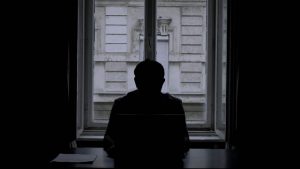(THIS ARTICLE IS MACHINE TRANSLATED by Google from Norwegian)
This year's DocLisboa took place in the laid-back, but increasingly polished, Portuguese capital from October 17 to 27 and had a mournful mood of farewell. After seven years at the helm, Cíntia Gil – the highly respected director of the festival who emphasizes nonfiction films, but which by far offers much more than documentaries – is seeking new challenges at Sheffield's Doc / Fest. Also the festival's "second in command", Italian Davide Oberto, thanked, for concentrating on his duties at the film festival in Turin. In their footsteps are now three new talents that have emerged under the wings of Gil and Oberto.
Gil is known for his direct and clear form: unsentimental and confrontational if necessary. Not surprisingly, she personally made sure to divert any rush to tearful "an era is over" speeches. Better to concentrate on the films, guests, and not least the new talents that emerged during the stimulating and politically engaging event "Green Years" ("Verdes Anos"), which after 17 festivals has been well established in the Portuguese and European cultural scene.
Game Willingness
During the last festival years, the Green Years program has been fruitful for newcomers in the film industry, as the program is reserved for just new talents – many of them students, or recent graduates from recognized film schools. New this year was that DocLisboa had opened the program's competition section for European productions; previously this has been reserved for Portuguese projects. Two of the projects that stood out had a world premiere, and they are likely to receive a lot of attention in the future. Both films focus on politically engaged men living in busy European capitals. The scope and consequences of their engagement are – typically enough – largely shaped and dictated by the context in which they are located, and in particular by the surroundings' relative relation to freedom.
The contrast between the political reality in Baku and Paris could hardly be greater.
French Pauline Laplaces A Tiny Country (A very small country) is a 58-minute character study by Patricio Salcedo, a middle-aged man who was radicalized by the French May revolt in 1968. He steadfastly doubts his anarchist conviction, despite being a Parisian newsstand and thus in a sense a capitalist .

Oktay Namazov's 21 minutes long Labyrinth (Labirint) is a co-production between Azerbaijan, Hungary, Belgium and Portugal. It is also a long way (or perhaps a coincidence) between Namazov and the film's subject, former political prisoner Rashadat Akhundov. Akhundov jailed for three years for (according to the movie review) to have "organized mass riots" against Azerbaijan's incumbent president, Ilham Alijev – president since October 31, 2003, re-elected for seven new years with 86 percent of the vote in 2018. The election was far from considered as freely. Akhundov feared further persecution after he was released. His family still lives in Azerbaijan. Akhundov himself, who for more than ten years worked as a banking analyst for BP, sought refuge and work in Budapest.
Namazov's film is a close-up portrait of Akhundov's life in the Hungarian capital – a metropolis that, ironically, is not exactly a flagship for freedom of expression. We see him striving to rise again after the psychological stresses of his time in prison ("don't lock the door" is the last Akhundov says to the director as the latter walks out the door from his apartment). Labyrinth takes place largely in stately furnished, illuminated rooms and, as the title indicates, it is all a claustrophobic affair. The film is a low-key revival of a painful exile, mitigated by easy-going friendship and raw humor between Akhundov and Namazov – and other Azerbaijanis they hang out with.
Persistence
I A Tiny Country Laplace uses narrow passages and close-up pictures to emphasize the seclusion of Salcedo's crowded kiosk, which he apparently never leaves during the long workday. A multitude of human beings float past the kiosk, but the proprietor has a number of regular customers ("I sell nonsense to idiots, but I also get to meet nice people") who he interacts with in a gentle and friendly – but also sometimes abrupt and hard – way . The talks are mainly about political issues (or maybe this emphasis is an editorial choice; three editors are credited): The 2017 presidential election is imminent, and Salcedo – who chooses not to use the right to vote – rarely puts his fingers in when he criticizes them which supports neoliberal leaders like Macron and Fillon. Salcedo also goes hard against director Laplace's passivity (heard, but not seen), which he regards as a symbol of the younger generation's lack of memory of the Mayo uprising in 1968. The film was filmed a few months before the Yellow West set fire to Paris and France .
The contrast between the political reality of Baku and Paris, highlighted and made clear through the juxtaposition of these two films, could hardly be greater: Laplace's medium-length film highlights a steadfast and world-renowned commitment that delves deep into the French people's soul. Labyrinths audience, on the other hand, may struggle to put Azerbaijan on the map: the former Soviet republic rarely asserts itself in global consciousness (beyond any vague knowledge of the country's recent oil wealth). According to Amnesty International's latest report: "The authorities have tightened the rights to express themselves freely, especially in the wake of revelations of large-scale political corruption. Independent news agencies have been closed and the owners arrested. The government's critics are being subjected to politically motivated prosecution and imprisonment, with unfair trials… »
There are still many political prisoners in Azerbaijani prisons; Akhundov is, relatively speaking, one of the lucky ones. And Salcedo? Even luckier.
Translated by Vibeke Harper


